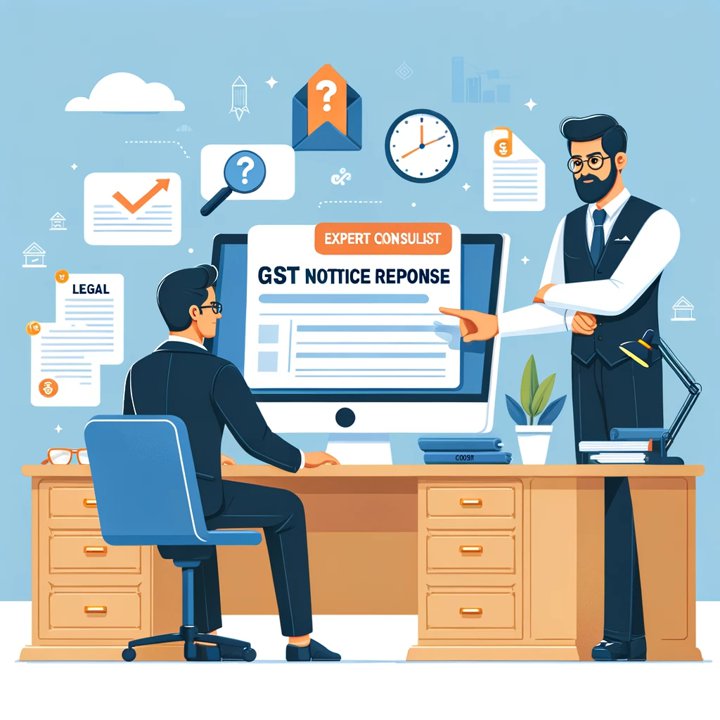How to Reply To GST Notice Under GST Act: A Detailed Guide by Virtualuditor
Navigating the complexities of GST notice is a significant challenge for many businesses in India. With the GST Act encompassing various rules and sections, understanding each aspect is vital for compliance. This blog post aims to shed light on the intricacies of responding to GST notices, with a special focus on sections 61 and 74(5), and how Virtualuditor, a top-notch GST consultant in India, can assist you in these matters.
Table of Contents
- Understanding GST Notices
- Difference Between GSTR-3B and GSTR-1
- Issues with Wrongly Availed ITC
- Insights on Section 61
- Demystifying Section 74(5)
- Steps to Respond to a GST Notice
- Why Choose Virtualuditor?
- Frequently Asked Questions
- Conclusion
Understanding GST Notices
GST notices are official communications from the tax authorities, typically issued for non-compliance, discrepancies in returns, mismatched transactions, or incorrect tax payments. These notices serve as a prompt for businesses to rectify their mistakes or provide clarification on specific tax-related issues.
Difference Between GSTR-3B and GSTR-1
Understanding the difference between GSTR-3B and GSTR-1 is crucial. GSTR-1 is a monthly or quarterly return that details the outward supplies or sales of goods and services. Conversely, GSTR-3B is a monthly summary return that includes details of both outward supplies and inward supplies (purchases) along with the payment of tax. Discrepancies between these two returns often trigger GST notices, as they may indicate unreported sales or mismatches in tax liabilities.
Issues with Wrongly Availed ITC
Another common reason for receiving a GST notice is the wrongful availing of ITC. This can occur when businesses claim ITC without the proper supporting documents or for ineligible expenses. The tax authorities are vigilant in identifying such discrepancies, often leading to the issuance of notices under sections like 61 and 74(5) of the GST Act.
Insights on Section 61
Section 61 involves the scrutiny of GST returns. If the tax authorities find any inconsistency or error in the return, they can issue a notice under this section, asking the taxpayer to provide explanations, documents, or rectifications.
Demystifying Section 74(5)
Section 74(5) pertains to tax demands in cases of intentional tax evasion. If the authorities believe there is deliberate wrongdoing, such as claiming excess ITC or underreporting sales, a notice under this section can be issued, demanding the taxpayer to pay the due tax along with interest and penalty.
Steps to Respond to a GST Notice
Responding to a GST notice involves a thorough analysis of the notice, gathering all relevant documents and evidence, preparing a detailed and factual response, and submitting it within the given deadline. Precision and clarity in the response are key to resolving these issues effectively.
Why Choose Virtualuditor?
Virtualuditor, with its expertise in GST law and compliance, stands out as an exemplary consultant for handling GST-related concerns and notices. Their experienced team can guide you through the intricacies of the GST Act, ensuring your responses to notices are accurate and compliant. Contact them at 9176044244 for unparalleled assistance.
Frequently Asked Questions
- What should be the first step after receiving a GST notice?
Upon receiving a GST notice, the first step is to carefully review the notice to understand the nature of the discrepancy or issue raised and gather all relevant documents related to the matter. - Can errors in GSTR-3B and GSTR-1 submissions lead to GST notices?
Yes, inconsistencies or errors in GSTR-3B and GSTR-1 submissions are common reasons for receiving GST notices, as they might indicate discrepancies in reported sales or tax liabilities. - What are the consequences of wrongly availing ITC?
Wrongly availing ITC can lead to GST notices and may result in the demand for repayment of the availed credit along with interest and penalties. - How can Virtualuditor assist in responding to GST notices?
Virtualuditor can assist by providing expert advice on interpreting the notice, preparing a detailed response, ensuring compliance, and representing your case to the tax authorities if needed. - Is it important to respond to GST notices within the specified time?
Yes, it is crucial to respond to GST notices within the specified time frame to avoid further legal implications or penalties.
Conclusion
Navigating GST notices can be complex, but with the right approach and expert guidance, it can be managed effectively. Understanding the differences between GSTR-3B and GSTR-1, the implications of wrongly availed ITC, and the specifics of sections 61 and 74(5) are crucial in responding to these notices. Virtualuditor stands as a reliable ally for all your GST-related queries and issues. For professional assistance, reach out to them at 9176044244.

